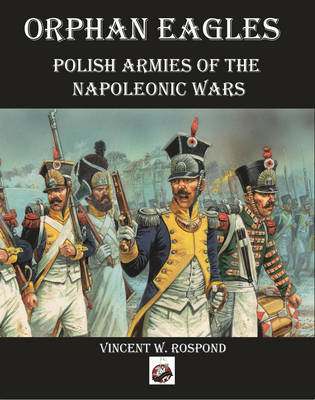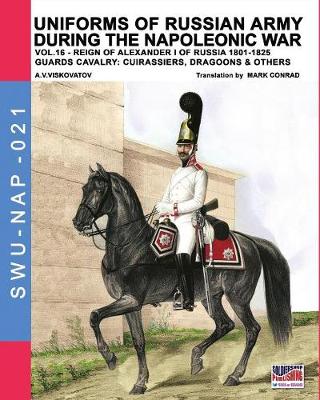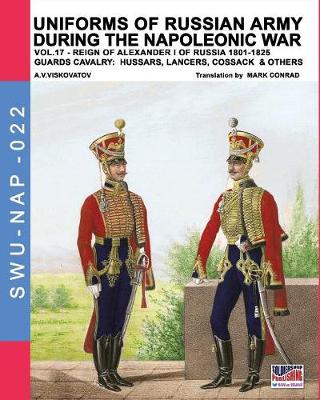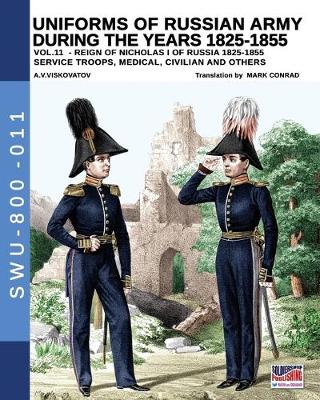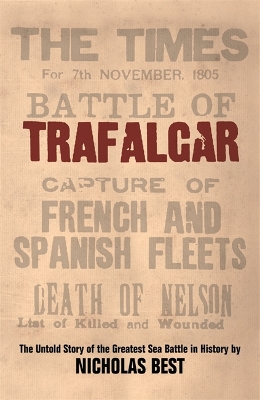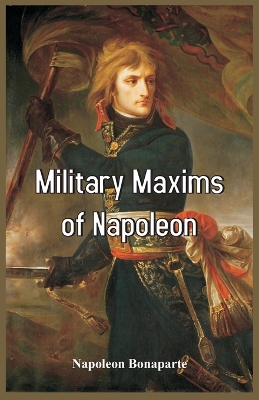Uniforms of Russian army during the Napoleonic war vol.16 (Soldiers, Weapons & Uniforms Nap, #21)
by Aleksandr Vasilevich Viskovatov
Uniforms of Russian army during the Napoleonic war vol.17 (Soldiers, Weapons & Uniforms Nap, #22)
by Aleksandr Vasilevich Viskovatov
Uniforms of Russian army during the years 1825-1855 - Vol. 11 (Soldiers, Weapons & Uniforms 800, #11)
by Aleksandr Vasilevich Viskovatov
The Napoleonic wars did not end with Waterloo. That famous battle was just the beginning of a long, complex transition to peace. After a massive invasion of France by more than a million soldiers from across Europe, the Allied powers insisted on a long-term occupation of the country to guarantee that the defeated nation rebuild itself and pay substantial reparations to its conquerors. Our Friends the Enemies provides the first comprehensive history of the post-Napoleonic occupation of France and...
Over two hundred years ago, on 21 June 1813, just southwest of Vitoria in northern Spain, the British, Portuguese and Spanish army commanded by the Duke of Wellington confronted the French army of Napoleon's brother Joseph. Hours later Wellington's forces won an overwhelming victory and, after six years of bitter occupation, the French were ousted from Iberia. This is the critical battle that Carole Divall focuses on in this vivid, scholarly study of the last phase of the Peninsular War. The ba...
A brilliant page-turning account of the most famous sea fight in history Beginning with a vivid recreation of Napoleon's army assembling at Boulogne for the invasion of England, Nicholas Best tells how the French fleet joined with their Spanish allies and set out for a decisive battle with the Royal Navy. Following events through the eyes of eyewitnesses on the gun deck as well as the admiral's cabins, he takes us to the Mediterranean and the West Indies and back to the coast of Spain as the ri...
French Napoleonic Infantry Tactics 1792-1815 (Elite, #159)
by Paddy Griffith
This book will provide a careful analysis of the preparation of the French troops from manual regulations to the training ground, as well a study of the changing quality of command and control within the army. Initially this ensured that the French infantry were virtually unstoppable and for several years they enjoyed blistering triumphs at Austerlitz and Jena. Paddy Griffiths explores the role of the French infantry at the apex of their powers and their role in these key battles. However, he al...
Russian Eyewitness Accounts of the Campaign of 1814
by Alexander Mikaberidze
In 1809 the dispossessed Friedrich Wilhelm of Brunswick, consumed by his desire for revenge against Napoleon, entered into an agreement with the Austrians to raise a new corps of infantry and cavalry. As a physical expression of this vengeance he decided to clothe his new troops all in black and adopted as his badge the skull and crossbones, resulting in his corps' christening as Die Schwarze Schar (the Black Horde). This book details the pivotal role that the Black Brunswickers played in major...
This superb and comprehensive book details the foreign units which formed such an important part of Napoleon's forces. It examines each non-French unit in turn, giving an overview of the unit's origins, its organizational and combat history, its uniforms and standards, and details of the unit's eventual fate. Colourful accounts, taken from contemporary reports and memoirs, emphasize the qualities of the unit and throw light on what life was like for many of the foreign soldiers recruited into th...
Nelson's History of the War - Volume X - The Russian Stand, and the Allied Offensive in the West
by John Buchan
In 1795 - the year Napoleon Bonaparte was appointed Commander-in-Chief of the French army in Italy - the seventeen-year-old Jean-Nicolas-Auguste Noel entered the Artillery School at Chalons. A year later, with Napoleon proclaiming himself the liberator of Italy, Noel was appointed second lieutenant in the 8th Regiment of Horse Artillery. Written in 1850, With Napoleon's Guns is his remarkable memoir of two decades in the Emperor's service. A trained artilleryman himself, Napoleon dramatically t...
Vie Historique Et Impartiale de Napoleon Bonaparte, Ex-Empereur Des Francais (Litterature)
by J M Gassier
Napoleon had a rich life of female accompaniment. Josephine was his love, but unable to have children, he divorced her in the cause of creating a dynasty. At the time of his divorce he remained deeply in love with Josephine and insisted she retained the title of Empress. Of his second wife, Louise, an Austrian princess, he said 'I have married a womb!' The second marriage was cold and somewhat unloving, but Napoleon remained under the delusion that she would follow him to Elba. In later years it...
The story of the Battle of Waterloo - of the ultimate defeat of Napoleon and the French, the triumph of Wellington, Blucher and their allied armies - is most often told from the viewpoint of the victors, not the vanquished. Even after 200 years of intensive research and the publication of hundreds of books and articles on the battle, the French perspective and many of the primary French sources are under-represented in the written record. So it is high time this weakness in the literature - and...
Napoleon Bonaparte dominated the public life of Europe like no other individual before him. Not surprisingly, the story of the man himself has usually swamped the stories of his subjects. This book looks at the history of the Napoleonic Empire from an entirely new perspective- that of the ruled rather than the ruler. Michael Broers concentrates on the experience of the people of Europe- particularly the vast majority of Napoleon's subjects who were neither French, nor willing participants in the...
